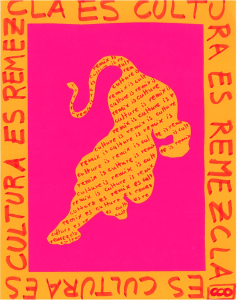Help us protect the commons. Make a tax deductible gift to fund our work. Donate today!
From 16 to 18 November, members of the Creative Commons (CC) Open Culture and Learning and Training teams attended GLAM Wiki in Montevideo Uruguay. In this blog post we look back at the event’s highlights from CC’s perspective.
GLAM Wiki is an extraordinary international gathering that brings together cultural heritage professionals (from Galleries, Libraries, Archives, Museums, etc.) with the vibrant Wikimedia communities. More than 150 participants from all over the word came together with the goals to:
- Identify strategic priorities for the GLAM Wiki communities that promote knowledge equity, diversity and inclusion.
- Exchange and build capacity around GLAM Wiki tools, outreach and collaborations.
- Reflect, discuss and think of new roadmaps for our existing tools and platforms.
- Reconnect after the pandemic, network and discuss the future of GLAM Wiki.
The program was rich and diverse and included four sessions organized by CC, summarized as follows.
Creative Commons sessions’ highlights
1. Remixing Open Culture: Get Creative with Creative Commons
In this session, we provided a short presentation about remixing open culture. ALL culture is a remix, and everything we create draws inspiration from the art we have seen and been inspired by. We asked participants to think about why open culture is important to them as an individual. Using public domain images, attendees created “propaganda” for open culture, openly licensing their new creations, as in the example below. The CC licensed works have been uploaded to Wikimedia Commons under the category: Open Culture Remix Posters. Create your own poster to promote open culture and upload it to Wiki Commons with the category “Open Culture Remix Posters”.

2. Towards a Recommendation on Open Culture – What, When, How?
In this session, we presented an overview of our work around the TAROC initiative and invited participants from the audience — coming from Chile, Morocco, India, Finland, Mexico, Serbia and Portugal — to share their open culture experiences in order to inform this international, community-focused initiative. Some of the topics raised include: the notion of culture is much broader than fine art or even “the arts”; open culture raises specific questions in the context of heritage preservation during armed conflict, where the risk of looting is heightened; better sharing might imply “conditional” sharing in certain contexts; the control over access and use of cultural heritage might be shared by a multitude of stakeholders; open culture raises financial challenges that must be addressed; and more.
This served as a continuation of our ongoing community consultation, after a session on Values at the CC Summit in October, where we polled the audience to learn more about some of the core principles that underpin the movement’s aspirations. These consultations will continue in-person and online with the Open Culture Platform.
3. Open Culture on Wikipedia
In this collaborative session, participants worked together to draft and publish the first Wikipedia articles dedicated to open culture. In one hour we managed to publish pages in English, French, and Spanish, which are now open for anyone to edit and contribute to. We started articles in Finnish and Swedish as well.
4. The CC Certificate for GLAM: learn about it by becoming part of a human sculpture collection
This workshop highlighted considerations from the CC Certificate for Open Culture, a professional development training that builds expertise in open licensing and open practices for cultural heritage professionals. With participants, we put the teaching into practice by creating an exhibit of human sculptures, “digitizing” the works, then evaluating the ethical, cultural, logistical, and copyright considerations around the digitized collection.
GLAM Wiki and the broader open culture context
In running our Open Culture Program, we strive to hold space for conversations about the complexities of openness and the practical implementation of better sharing, our strategic north star — sharing that is contextual, inclusive, just, equitable, reciprocal, and sustainable.
As we engage with diverse stakeholders around the globe and as the landscape of the internet continues to evolve, we face new and important questions around how culture should be shared in a variety of contexts. For example, how can we envision exploration, and not exploitation, of the commons in the age of AI? What does equity look like in a global context where not all GLAMs have the resources for digitization? How can we think of “open” as a means to support wider cultural policy ambitions, not just an end in and of itself?
Our participation in GLAM Wiki was a way to tackle these questions and continue some of the exciting conversations we have had in the past months, including at the CC Summit, on TAROC, traditional knowledge and Indigenous cultural heritage, open culture and generative artificial intelligence (AI), and the future of the open movement.
We will continue to explore these complex topics to gain fresh perspectives in our Open Culture Live webinars, publications, Open Culture Platform calls and activities, and at in-person events where we can connect with the open culture community.
For more information on how to get involved, including in translations of our Open Culture resources:
- Join the Open Culture Platform
- Sign up for our Open Culture Matters newsletter
- Register for the CC Open Culture Certificate
- Write to us at info@creativecommons.org